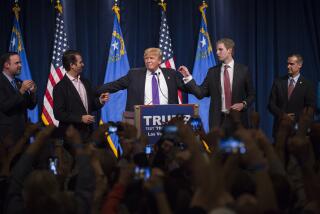CAMPUS & CAREERS GUIDE : Stealth Graduate School : RAND Puts the Focus on Objective Analysis
- Share via
When UCLA held its commencement exercises last month, so many college and professional school students were due to receive diplomas that the festivities lasted seven days.
The RAND Graduate School, by contrast, had so few graduates this year that it fit all their names--and last year’s, too--on one page of its pocket-size commencement invitation. With room to spare.
To watch the 15 men and women receive their doctorate degrees during a recent ceremony at RAND’s Santa Monica headquarters, one would never guess that this tiny, little-known institute for public policy analysis is in fact the largest of its kind in the nation.
“We’re the stealth graduate school,” Jess Cook, a RAND spokesman, joked about the think tank’s 25-year-old educational program, which has trained 113 specialists on everything from arms control to space exploration.
But this low-profile school provides high-impact people. One alumnus is Gov. Pete Wilson’s chief economist. Another is co-director for the largest AIDS survey in the nation. Others work in government and private industry, and several teach at the nation’s leading universities.
Policy analysis is a uniquely American field of study--other leading programs are at Harvard University’s John F. Kennedy School of Government, Carnegie Mellon University and UC Berkeley--that seeks to train scholars to help public and private leaders make well-reasoned, fact-supported choices.
To prepare its students, the RAND Graduate School--or RGS, as it is usually called--offers rigorous training in statistics, economics and applied mathematics. In addition, students work half time during the academic year and full time during summers on ongoing RAND research projects, which are largely funded by the government.
Overall, the school attempts to give its graduates the tools to address all kinds of problems, from risk prevention in adolescent sexuality to Kazakhstan’s resistance to economic autonomy (to cite the dissertation topics of two recent students). Most important, the school emphasizes that problems must be addressed dispassionately and objectively.
“It’s the Sgt. Joe Friday School of Analysis: Just the facts, ma’am,” said Philip Romero, a 1988 graduate who is Wilson’s chief economist. He called the training “hyper-quantitative and hyper-rational.”
“Intuition, gut feeling, anecdotes--they don’t count for a lot [at the school] unless they provide life to the numbers,” he said, adding that such training at times threatened to turn him into a robot. “My wife made the decision in my second year that . . . I had left the human race and she could expect me back a few years in the future.”
Several students agreed that learning how to divorce one’s self from opinions--to “put your feelings in a box,” as one student described it--had odd side effects.
“You catch yourself picking up very RAND-like words and using them in your vocabulary,” said Patricia Brukoff, a recent graduate who follows macroeconomic developments in five of the former Soviet republics as an international economist at the Treasury Department. “Fungible is a big RAND word.”
So is paradigm. Everyone at the school seems to be struggling with one. At RAND, several students joked, there is an impassive term for everything.
In the real world, you might say that some people value a good haircut more than others. At RAND, you would call that variations in interpersonal utility.
The RAND Graduate School was launched in 1970, one year after the National Science Foundation warned that the nation needed to produce more scientifically trained, interdisciplinary analysts who were equipped to address its complex domestic and national security problems.
Since the Rand Corp. was created in 1948, its stated goals have been to promote scientific, educational and charitable purposes, “all for the public welfare and security of the United States of America.” But when the graduate school was proposed, some RAND staffers balked.
“We’ve got all the advantages of a university without the bothersome presence of students,” Charles Wolf, who has been dean of the school since it was founded, recalls his colleagues saying. “Why do you want to add all that strife?”
But Wolf and others at RAND believed that adding students would encourage a spirit of inquiry that would be good for the serious-minded research institution.
Early students--back when the Pentagon footed much of the bill for RAND’s research--tended to focus on defense-related topics. Today, more than one-third of RAND’s research projects are funded by domestic agencies such as the National Institutes of Health or the Department of Education. And the students arrive with more diverse interests, and often very little quantitative background.
Carolinda Douglass, a recent graduate who wrote her dissertation on Alzheimer’s patients, was one of those people. At the recent commencement, she introduced herself as “a touchy-feely in the land of the quantoids.”
At times, her previous training in aging studies led her to challenge the very precepts that RAND was trying to teach her.
“They stress being as objective as possible,” she said. “But my difficulty came in the fact that I found the methods themselves sometimes had certain biases in them. Why is it you might be caring more about cost and efficiency than about quality of life?”
Douglass’ question points out a potential flaw in the policy analyst’s thought process: The tendency to value data that can be measured more than data that can’t.
Wolf, RGS’s dean, is familiar with the problem, and admits he sometimes suffers from it himself.
“There’s an awareness that frequently what you can measure is not the whole problem,” he said. “It’s good to have techniques and analytical instruments, but you have to remember: There are people around.”
Sam Bozette, a recent graduate who is helping to coordinate a survey of 4,000 adult AIDS patients in 30 metropolitan areas, says this kind of constant re-examination is typical at the think tank. And awareness of the complexity of problems, he said, helps prepare students for the real world.
More to Read
Sign up for Essential California
The most important California stories and recommendations in your inbox every morning.
You may occasionally receive promotional content from the Los Angeles Times.










